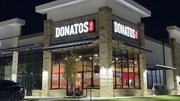Article
5 pros and cons of scaling your restaurant business
Before you sign on the dotted line for a new location, consider these pros and cons of scaling your restaurant business.

December 7, 2015
By Marc Glazer, BFS Capital
Every restaurant owner wants to run a successful business, but the more ambitious ones dream of one day expanding beyond just one location and a handful of employees.
Whether it’s opening up additional locations, expanding the menu or hiring additional staff, scaling a business is not a decision that should be made lightly. Countless restaurants have tried expanding before they were ready, only to struggle with properly managing a larger business, but there are plenty of success stories, too.
Take for example Jamar White, founder of New York City-based Buffalo Boss. White’s lifelong dream was to own a restaurant and sell one of his favorite foods — buffalo wings. He opened his first Brooklyn location in 2010, and then in 2012, with business booming, had an opportunity to open a second location at the Barclays Center. To do that, however, he needed cash.
Unfortunately, White didn’t have access to traditional lending sources because Buffalo Boss was such a young business. Instead, he looked to an alternative lender, which stepped in and give him enough money to expand and continue day-to-day operations.
“These are the types of loans that save your life,” said White. “It blew our mind that there were alternative financing opportunities. It opened our world up to possibilities and allowed us to think outside the box, to think about expansion.”
White used the loan to secure a Barclays Center location, and came back to the lending company again just a couple of years later to help open a third location in Harlem. He said the deal gave his company “an opportunity to grow and create jobs.”
White’s story is an entrepreneur’s dream, but not every restaurant owner is so lucky. Before you sign on the dotted line for a new expenditure, consider these pros and cons of scaling your restaurant business.
Con: More expenses
Many business leaders choose to scale because they believe it will bring in revenue. This is generally true. Selling food to more customers and more markets will typically lead to more cash flowing in. This could mean a bigger paycheck for you and your employees. It could also mean your restaurant finally has the resources to invest in a new website or to hire a communications firm, allowing you to grow at an even faster rate.
Just because more revenue is coming in, however, doesn’t automatically mean your business will enjoy bigger profits. Every additional storefront or menu item comes with an added cost and it can be difficult to predict exactly what those costs will be, especially in the short-term. For instance, opening a new location might mean more consumers have access to your food. But the location may be difficult to access, or there is too much competition in the area, or you simply underestimated the local population’s demand. These are all important variables to consider.
Pro: Economies of scale
One of the main reasons small businesses choose to ramp up their operations is economies of scale, which is defined as the cost advantage that results from increased output of a product. In other words, the cost of creating one unit (a sandwich for instance) goes down as the restaurant produces more of that item.
Creating economies of scale is one of the best ways to boost profits. If you can produce 100 units of something for the same price that it previously cost you to produce 75 units, then those extra 25 units are pure profit.
Con: Supply chain management issues
Just because there is the potential for economies of scale, however, doesn’t mean your business will necessarily achieve them. Managing a larger business is hard and it takes many years of experience to maximize every efficiency — or even a few efficiencies. Supply chain management involves streamlining a business’ supply-side activities to maximize customer value and to gain a competitive advantage in the marketplace. Every part of the chain needs to be operating smoothly to ensure that there aren’t delays or other problems along another segment of the chain.
This is especially true of restaurant or hospitality-oriented businesses. If a shipment of king crabs is late, then a restaurant needs to take a potentially popular dish off their menu. If the shipment is too early, then the crabs might spoil before they’re needed. Either outcome could be potentially disastrous for a business, so be sure you can handle the added layer of complexity before expanding.
Pro: Larger workforce
Many restaurants rely on a small, tight-knit staff, some of whom have likely been with the business since it started. With such a small staff it’s difficult to do anything other than focus on the day-to-day operations of the business. Fortunately, scaling your business often allows you to also expand your workforce, whether it’s a handful of new employees or 100.
A larger staff allows your business to pursue many more opportunities from both a sales and marketing standpoint. You could finally host that community event, or participate in a cooking competition or shoot a commercial, all without disrupting the daily flow of the restaurant business.
Con: Brand dilution
The downside of having a larger workforce is that not every employee may believe in your restaurant’s mission. This is especially true when expansion involves opening new locations. The employees you hire to staff the new location may not have the experience of working with you and your earliest employees, so they may not be as motivated — or able — to deliver the high level of service your customers have come to expect.
This issue of brand dilution can be remedied with extensive training and ongoing site visits, but it is nonetheless a risk of hiring more employees.
Whether or not you decide to expand your operations, keep in mind that every business grows at its own rate. Scaling your business too early can have disastrous consequences, but if you wait too long you risk getting passed by competitors. Remember to take these pros and cons into consideration before you make your final decision.
Marc Glazer is president and CEO of BFS Capital, a technology enabled financing platform that provides loans of up to $2 million for small businesses in all 50 states, Canada, and the United Kingdom.
 ChatGPT
ChatGPT Grok
Grok Perplexity
Perplexity Claude
Claude








